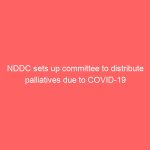By Jerome-Mario Utomi.
In the evening of Saturday 2nd May, 2020, a friend who is also a member of the self appointed group of people, who try to prevent crime in my area during the Federal Government directed lockdown period in Lagos, drew my attention to a post that read; private sector should come to the aid of my dear rich but poor Delta. We need Covid 19 test centres urgently. There is no reason not to have one-at least a molecular one.
The man brought this to my attention because he knew that I am an advocate of good governance, and someone who sees it as our mutual responsibility to ensure that our environment are well protected, our students have access to both quality and affordable education, and our health sector in perfect order.
While commending the post, as it is important to focus on issues such as this using different media and communication techologies particularly the social media has proved to be a platform for advancing freedom of speech and awareness creation, pursuing the truth, and a decentralized creation and distribution of ideas; in the same way, that government is a decentralized body for the promotion and protection of the people’s life chances.
That said post, however, elicited further reactions.
whereas many hailed the effort the state government is making to manage the challenge posed by the Covid 19 pandemic; insisting that the state has been proactive in their approach, others argued that the state did established a test centre, stating that the test of the last reported case of Corona Virus in the state was carried out in the state as against the usual practice of going to Irua General Hospital in Edo state. But to the rest, such claim was viewed with scepticism. They explained that if what happened in Lagos state, had taken place in Delta, the death rate would have been more ‘drastic and graphic ‘.
The boundaries between these spheres shifted back and forth until a most instructive clarification came from another concerned citizen who stated that the challenge was not Delta state specific-but one of perspective that cuts across all the state in the region.
He drew the attention of the ‘house’ to a news report where the Pan Niger Delta Forum (PANDEF) and Ijaw Youth Council (IYC) deplored the existence of only one coronavirus test centre in the entire South-South geopolitical zone that had no fewer than 50 confirmed cases of the dreaded disease. And implored the governors of Bayelsa, Rivers, Akwa-Ibom, Cross River, Edo and Delta States, making up the BRACED Commission, to collaborate and establish the virus test centres in the region to mitigate its spread.
‘Stressing that a situation where an economically strategic region with over 30 million Nigerians would still have only one coronavirus test centre located in Edo State months after the first index case in Lagos, was unacceptable’.
He however argued that it is not about the system but the leaders in the region.
In his words, experience of development has shown that every society needs good people to have good government. As no matter how good the system of government is, bad leaders will bring harm to their people. On the others, evidents abounds that society could be well governed inspite of poor system of government, because good, strong leaders were in change’.
To further buttress this position, he queried; if the governors elected by the people of the region right from May 1999, were authentic leaders, if they had demonstrated a passion for their purpose, practiced leadership values consistently, led with their hearts as well as their heads, established long term, meaningful relationships and have the self discipline to get result, by now, the region will not be waiting for the Federal Government to provide solutions to real and imagined woes of the people of the region.
What step or effort had the successive state government made right from May 1999, when democracy re-emerged in the country, to improve the life chances of the people? Has the billions of naira collected by these governors reflected in the infrastructural availability in the region? Or that of the human capital development of the people of the region? Who should be blamed more? State or the Federal Government?
Definitely, it is sad that the Federal Government has not thought it wise to establish more test centres in the South-South-particularly as the distance from Rivers, Akwa Ibom, and Cross River to Edo State for testing is too far for only one centre to serve these states. That not withstanding, considering the volume of money at their disposal, why must they (state governors) wait for the Federal Government and private sector before such could be made avaliable?
I know the argument about this. I could give you a lecture about this. I could talk at length about it. And I could go on and on talking about what is happening in the Niger Delta. It is not Federal Government but state governors in the region that are the real enemies of the people of Niger Delta, He submitted.
What does this all mean to us? Can creative leadership be taught? Can it be cultivated in the Niger Delta region? Why is it taking governors from the region eternity to create a leadership strategy that meets the diverse demand of the people? Why is fair process lacking in the day to day administration of the region?
To provide answers to the above beginning with last, Chan Kim and Renee Mauborgne explain why fair process is so rare. The first involves power. Some leaders continue to believe that knowledge is power and that they retain power only by keeping what they know to themselves. Their implicit strategy is to preserve their managerial discretion by deliberately leaving the rules for success and failure vague. Others maintain control by keeping the people at arm’s length. For them, a fair process would represent a threat.
Could this be the only explanation fueling underdevelopment of the region? Definitely not,-as there is also the challenge of cronyism, corruption, backdoor or under the counter business practices. There is no question that these contributed to the crisis in the region and aggravated the pains of the people in that region.
To change this narrative, two things need to be done.
First, Deltans must recognize that public order, personal and national security, economic and social programmes, and prosperity is not the natural order of things but depends on the ceaseless efforts and attentions from an honest and effective government that the people elect.
Governors on their part should not fail to remember that it takes a prolonged effort to administer a country well and change the backward habits of the people. They must be able to identify the problems and opportunities they face, evaluate the options they have for moving forward, and then make necessary trade-offs and decisions about how to proceed with the development of the region.
Utomi, Lagos, Nigeria.
Contents
- By Jerome-Mario Utomi.
- In the evening of Saturday 2nd May, 2020, a friend who is also a member of the self appointed group of people, who try to prevent crime in my area during the Federal Government directed lockdown period in Lagos, drew my attention to a post that read; private sector should come to the aid of my dear rich but poor Delta. We need Covid 19 test centres urgently. There is no reason not to have one-at least a molecular one.
- The man brought this to my attention because he knew that I am an advocate of good governance, and someone who sees it as our mutual responsibility to ensure that our environment are well protected, our students have access to both quality and affordable education, and our health sector in perfect order.
- While commending the post, as it is important to focus on issues such as this using different media and communication techologies particularly the social media has proved to be a platform for advancing freedom of speech and awareness creation, pursuing the truth, and a decentralized creation and distribution of ideas; in the same way, that government is a decentralized body for the promotion and protection of the people’s life chances.
- That said post, however, elicited further reactions.
- whereas many hailed the effort the state government is making to manage the challenge posed by the Covid 19 pandemic; insisting that the state has been proactive in their approach, others argued that the state did established a test centre, stating that the test of the last reported case of Corona Virus in the state was carried out in the state as against the usual practice of going to Irua General Hospital in Edo state. But to the rest, such claim was viewed with scepticism. They explained that if what happened in Lagos state, had taken place in Delta, the death rate would have been more ‘drastic and graphic ‘.
- The boundaries between these spheres shifted back and forth until a most instructive clarification came from another concerned citizen who stated that the challenge was not Delta state specific-but one of perspective that cuts across all the state in the region.
- He drew the attention of the ‘house’ to a news report where the Pan Niger Delta Forum (PANDEF) and Ijaw Youth Council (IYC) deplored the existence of only one coronavirus test centre in the entire South-South geopolitical zone that had no fewer than 50 confirmed cases of the dreaded disease. And implored the governors of Bayelsa, Rivers, Akwa-Ibom, Cross River, Edo and Delta States, making up the BRACED Commission, to collaborate and establish the virus test centres in the region to mitigate its spread.
- ‘Stressing that a situation where an economically strategic region with over 30 million Nigerians would still have only one coronavirus test centre located in Edo State months after the first index case in Lagos, was unacceptable’.
- He however argued that it is not about the system but the leaders in the region.
- In his words, experience of development has shown that every society needs good people to have good government. As no matter how good the system of government is, bad leaders will bring harm to their people. On the others, evidents abounds that society could be well governed inspite of poor system of government, because good, strong leaders were in change’.
- To further buttress this position, he queried; if the governors elected by the people of the region right from May 1999, were authentic leaders, if they had demonstrated a passion for their purpose, practiced leadership values consistently, led with their hearts as well as their heads, established long term, meaningful relationships and have the self discipline to get result, by now, the region will not be waiting for the Federal Government to provide solutions to real and imagined woes of the people of the region.
- What step or effort had the successive state government made right from May 1999, when democracy re-emerged in the country, to improve the life chances of the people? Has the billions of naira collected by these governors reflected in the infrastructural availability in the region? Or that of the human capital development of the people of the region? Who should be blamed more? State or the Federal Government?
- Definitely, it is sad that the Federal Government has not thought it wise to establish more test centres in the South-South-particularly as the distance from Rivers, Akwa Ibom, and Cross River to Edo State for testing is too far for only one centre to serve these states. That not withstanding, considering the volume of money at their disposal, why must they (state governors) wait for the Federal Government and private sector before such could be made avaliable?
- I know the argument about this. I could give you a lecture about this. I could talk at length about it. And I could go on and on talking about what is happening in the Niger Delta. It is not Federal Government but state governors in the region that are the real enemies of the people of Niger Delta, He submitted.
- What does this all mean to us? Can creative leadership be taught? Can it be cultivated in the Niger Delta region? Why is it taking governors from the region eternity to create a leadership strategy that meets the diverse demand of the people? Why is fair process lacking in the day to day administration of the region?
- To provide answers to the above beginning with last, Chan Kim and Renee Mauborgne explain why fair process is so rare. The first involves power. Some leaders continue to believe that knowledge is power and that they retain power only by keeping what they know to themselves. Their implicit strategy is to preserve their managerial discretion by deliberately leaving the rules for success and failure vague. Others maintain control by keeping the people at arm’s length. For them, a fair process would represent a threat.
- Could this be the only explanation fueling underdevelopment of the region? Definitely not,-as there is also the challenge of cronyism, corruption, backdoor or under the counter business practices. There is no question that these contributed to the crisis in the region and aggravated the pains of the people in that region.
- To change this narrative, two things need to be done.
- First, Deltans must recognize that public order, personal and national security, economic and social programmes, and prosperity is not the natural order of things but depends on the ceaseless efforts and attentions from an honest and effective government that the people elect.
- Governors on their part should not fail to remember that it takes a prolonged effort to administer a country well and change the backward habits of the people. They must be able to identify the problems and opportunities they face, evaluate the options they have for moving forward, and then make necessary trade-offs and decisions about how to proceed with the development of the region. Utomi, Lagos, Nigeria.












